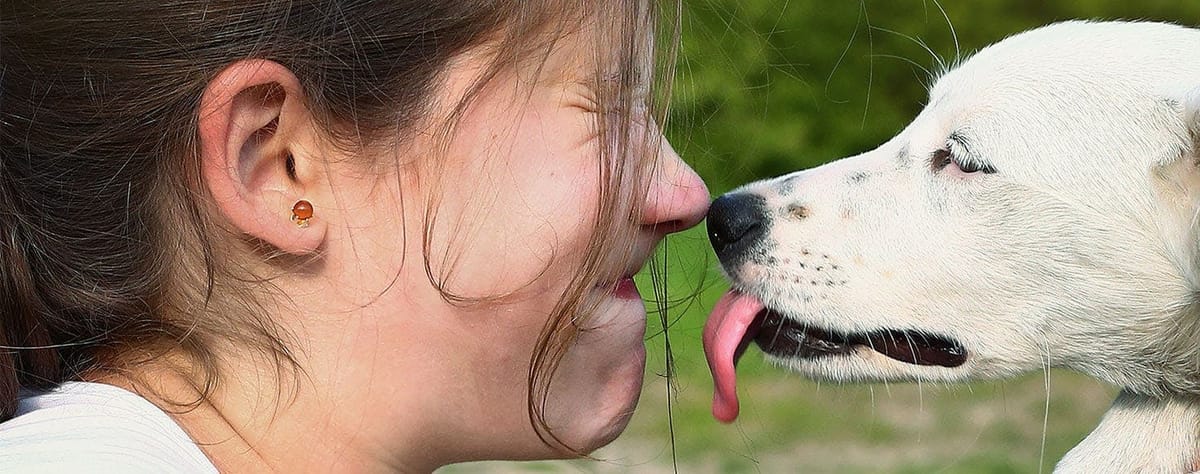The Lick of Love (Is a Dog's Flora Bad for You?)

By Em (publisher, writer, and reluctant stand-in)
Our regular menagerie of literary beasts—Ed the dog, Penelope the owl, and Maurice the goat—are enjoying their day off, presumably engaged in whatever activities animals pursue when not forced to compose prose for human consumption. Thus, you find yourself subjected to my ramblings instead. How terribly lucky for us both.
Today's meditation concerns that most intimate of canine affections: the face-lick. If you've already recoiled in horror and reached for the hand sanitizer, perhaps this isn't the essay for you. But then again, propriety has never been as interesting as its alternatives.
As a boy, I shared my home with a Cocker Spaniel named Smokey, a creature whose enthusiasm for coating my face with his saliva was matched only by my mother's horror at witnessing it. "Don't let the dog lick your face," she would insist with the urgency of someone warning against playing in traffic or accepting candy from strangers. "His mouth has germs, and you could get sick."

Mother's admonitions, like most parental wisdom, went gloriously ignored. I continued my inter-species romance with Smokey's tongue, and remarkably failed to develop plague, dysentery, or whatever dreadful malady was supposed to befall me. One assumes Mother simply hadn't kept up with the latest advancements in canine bacteriology. A forgivable oversight.
In adulthood, Mrs. Em and I transformed our home into something resembling a kennel with better furniture. At our peak, nine dogs roamed our halls—a number that would make most people question our sanity, and rightfully so. The star of this doggy constellation was Max the beagle, who developed a bedtime ritual that would horrify the germophobic masses. Each night, with the dedication of a priest performing sacraments, Max would approach my recumbent form and systematically lick my entire face—forehead, cheeks, eyebrows—before making archaeological expeditions into my ears and nostrils.
Having completed this charming ablution, he would migrate to Mrs. Em's side of the bed and promptly fall asleep, never once offering her the same dubious blessing. Even dogs, it seems, have their preferences.
Our current canine triumvirate includes Bob (yes, that Bob, the political correspondent whose insights on the state of democracy could make one long for benevolent dictatorship), Cooper the American bulldog (whose sweetness of disposition makes one wonder if he's really a dog at all and not some saint reincarnated incorrectly), and Aubrie, a Lhasa Apso mix whose tongue appears to operate independently from any conscious control.
Aubrie has appointed herself the successor to Max's facial cleansing ministry. The moment my head meets the pillow, she pounces with the precision of a surgeon and the enthusiasm of a teenager at their first unchaperoned party. Her tongue seeks architectural features of my face I wasn't aware existed. Like her predecessor, upon finishing with me, she moves to my wife's territory but abstains from offering the same services. Perhaps Mrs. Em simply tastes terrible. It's not a hypothesis I'm inclined to test personally.
Recently, while browsing that intellectual powerhouse known as Upworthy (where journalism goes to put on sweatpants and eat ice cream straight from the container), I discovered an article about dog saliva that caught my attention nearly as efficiently as Aubrie's tongue catches my nostrils.
An eighth-grade girl—displaying more scientific curiosity than most adults maintain past their first mortgage—created a science fair project investigating whether dogs' tongues are cleaner than humans'. The experiment was evidently impressive enough to win her a Young Naturalists Award from the American Museum of Natural History, which is more than most of us have accomplished while simultaneously navigating puberty.
Her hypothesis suggested human mouths would be cleaner because humans brush their teeth and dogs lick garbage. A reasonable assumption, if one has ever observed a dog's enthusiasm for investigating sidewalk discoveries. Through some miracle of academic connections, this child secured a grant from the State Hygienic Lab at the University of Iowa, proving that some eighth-graders have better networking skills than most middle managers.
Without boring you with methodological details that would strain both our attentions, her conclusion was that dog and human "mouth flora" (a delightful euphemism for "bacteria that would look terrifying under a microscope") are fundamentally different species. The bacteria populating a dog's mouth has about as much in common with human oral bacteria as I have with my tax accountant.
Although dogs host more bacterial colonies than humans—presumably because they don't spend $9.99 on antimicrobial mouthwash—these colonies pose no particular threat to human health. They're simply bacterial tourists visiting from another biological kingdom, with no interest in colonizing your tonsils.
Our young scientist's conclusion? She will "feel guiltless about letting my dog lick me." Science has spoken, and who are we—mere adults with mortgage payments and deteriorating metabolisms—to argue?
So the next time your canine companion expresses the desire to bathe your face in saliva, you may submit with the confidence of someone backed by eighth-grade science. Though I would recommend keeping a towel nearby, not for sanitary purposes, but because dignity, unlike bacteria, can be irretrievably lost.